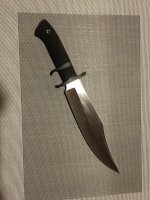Knife legislation Belgium

There are many misunderstandings about the weapons legislation in Belgium regarding knives. We often hear from customers: "Surely you can't have that in Belgium?" Most knives are allowed under Belgian law. So you can buy and have them, but you cannot always have them with you everywhere. The explanation below comes from the Commissioner of Police, of the Federal Police.
Some knives are designed as blank weapons, others simply as tools or for household use. The weapon law defines “blank weapon” as follows: each weapon provided with one or more blades that have one or more cuts.
Forbidden knives
The Weapons Act of 8 June 2006 classified certain bladed weapons in the category of prohibited weapons. With these knives, everything is prohibited: possession at home, possession, pregnancy, manufacture, repair, display for sale, sale, give away, transport, store or advertise.
The prohibited knives are:
• spring blades with automatic locking
• knives that come out of the handle by gravity and lock automatically
• butterfly knives, of which the blade is released by folding open the handle in two parts
• blades designed to throw with precision
• throwing stars in metal, with sharp points
• bladed weapons that look like another object in appearance
These include: swords, sabers, daggers, dagger knives, swords, bayonets, hunting knives and assault axes. They meet the definition of a blank weapon and belong to the category of freely available weapons. Owning it at home is free, as is the sale and mere transport.
The home and garden knives (including: pocket knives, folding knives, whether or not blocking, Opinels, kitchen knives, cutters, work utensils, etc.) that are designed as tools and not as weapons, are not prohibited.
But be careful! The gestation of a freely available blank weapon, namely its immediate availability in public, is subject to a legitimate reason. The legal reasons are not laid down by law, so common sense determines the degree of danger to public safety for each case individually. For example, a hunter can carry a hunting knife while hunting. A fisherman can carry a dagger while working with nets. A dagger knife is part of the equipment of a deep-sea diver, etc.
According to Article 135 of the Criminal Code, the word “weapons” is understood to mean: all appliances, implements, tools or other cutting, stabbing or bruising objects that have been taken in hand to kill, injure or hit, even if none made use of it.
Every knife becomes a prohibited weapon as soon as it is clear by concrete circumstances that its owner, holder or carrier intends to use it to threaten or injure people.
Source: LokaalPolitie.be
Reviews
No reviews were found.
